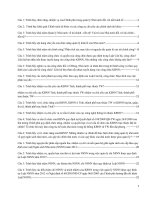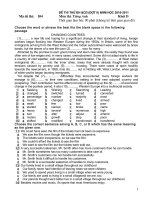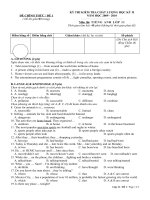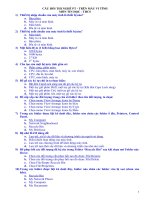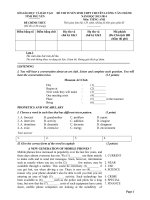CÂU HỎI VÀ ĐÁP ÁN THI NÓI TIẾNG ANH DU LỊCH 1 VÀ 2 (ENGLISH FOR TOURISM, SPEAKING TEST)
Bạn đang xem bản rút gọn của tài liệu. Xem và tải ngay bản đầy đủ của tài liệu tại đây (432.66 KB, 16 trang )
ENGLISH FOR TOURISM 1
SPEAKING - TASK 1
The pie chart shows the average tourist spending breakdown in Britain.
At first glance, it is clear that the main factor influencing this decision was the hobbies
and basic needs of the tourists.
As can be seen from the chart, the percentage of the spending on accommodation
accounts for almost 35% of the total spending because there are many festivals, concerts,
events and places to see in Britain.
Tourists usually stay many days in Britain to go to these festivals and events, therefore
they require accomodation.
Accomodation also include additional services such as free bike storage, laundry, drinks,
Internet costs and room service to meet the needs of the customers.
A large portion of the budget (24%) is spent on eating out. Britain has many popular
restaurants that offer high quality and tasty foods. Tourists often go to expensive
restaurants where food is cooked by very popular chefs.
The proportions for shopping and travel within the UK have a quite similar spending
breakdown, at 19% and 14% respectively.
Tourists probably tend to do more shopping at home rather than in Britain where the
prices are much higher. Britain has lots of low cost public transportation that allows
tourists to get to the most popular places.
Another type of spending is entertainment, but this accounted for only 5%. Many
festivals and events are free, and would explain why not a lot is required to be spent on
entertainment.
Interestingly, only a small minority (4%) is left for other services because in the
accommodation already includes most of the basic services.
BaVu Nguyen – 13DLH1 – University of Finance–Marketing
October 2015
SPEAKING – TASK 2
MAKE A SHORT PRESENTATION
Hoi An is a Ancient Town in Vietnam, located in the South Central Coast region,
in the Quảng Nam Province. Hội An is recognized as a World Heritage Site by
UNESCO. Hội An translates as "peaceful meeting place".
Hoi An city has warm weather the whole year with its average temperature of 29
Degree Celsius. The city only has two main seasons: rainy and dry seasons instead
of four seasons like in Northern Vietnam. Hoi An’s dry season from February to May is
the best time to visit the town because its weather becomes very beautiful with moderate
temperature, less rain and warm sunshine.
Hoi An is a small peaceful town, it is easy to remember street names and get
around town. The best way to experience Hoi An, many have said, is to rent a bicycle.
This service is offered at most tour companies and hotels and it costs about 20,000VNĐ
per day. Cyclos are not as abundant as Hue and maybe a good way to slowly experience
Hoi An beauty and take photos. An hour trip would cost about 30,000 VND. Then,
Taxi is a good option if you want to get from one place to another fast.
One of the great pleasures of any visit to Hoi An is strolling along the beautiful
streets of the old town at night under the flickering lights of the many beautiful lanterns.
These simple colorful lanterns are both part of Hoi An culture and Hoi An today.
Besides,
Cua Dai beach is closest to Hoi An, is very beautiful and is well worth a visit to cool off when the heat starts to get to you.
Hoi An has many bars and night clubs. Hoi An Traditional Art Performance
Theatre, a place which attracts a lot of visitors. Moreover, you can cruise on Hoai river,
it’s a great experience for you. If you are lucky enough to arrive at the town on the 14th
day of a lunar month, Hoi An will be much more charming with its Full Moon Festival
and “Old Street Night” exclusively available on that day.
Wandering around the ancient town, you could enjoy all Hoian cuisines, such as
“caolau”, “my quang” (special noodle of Quang Nam), “banh beo”, “banh vac”, “com
ga” in all restaurants in Hoi An, but to enjoy the cuisine of best quality, it is advisable to
find out more local options.
BaVu Nguyen – 13DLH1 – University of Finance–Marketing
October 2015
SPEAKING – TASK 3
BOOK A HOLIDAY
TRAVEL AGENT:
Hello, can I help you?
CUSTOMER:
Yes, we’re looking for a holiday in September. We want to find a
nice place to relax because our work is very stressful.
TRAVEL AGENT:
OK, well. What about going to Lao Chai and Ta Van in Sa Pa? Sa
Pa is such a quiet and peaceful place. Especially in September, you
can see beautiful scenes of rice terraces that look like a work of
art, you will be impressed by the waterfalls and mountains…
CUSTOMER:
Yes, we thought that. In fact we saw that at Internet and TV. It is
very beautiful but it’s along flight, isn’t it?
TRAVEL AGENT:
It is two hour flight to Ha Noi. When you arrive in HN, our shuttle
car will pick you up at the airport and take you on a 9 hour ride to
the hotel. On the road the car will stop once for a rest. You will
forget all the stress and fatigue (tiredness) when you see the
peaceful scenery in Sa Pa.
CUSTOMER:
Sounds good, ok let’s stay with Sa Pa.
TRAVEL AGENT:
What type of accommodation are you looking for? I thịnk it will
be better if you stay in local people houses in Sa Pa. It will help
you blend with the community. You can still choose to stay at a
hotel, but the prices will be high.
CUSTOMER:
I think that it is not convenient to stay in local people houses in Sa
Pa. That is why I want to stay at a hotel where the windows have a
good and clear view of the outside.
TRAVEL AGENT:
The Lan Huong Hotel will meet your needs. This hotel is located
near the rice terraces and has lots of good service along with bed
and breakfast.
CUSTOMER:
It sounds great!
TRAVEL AGENT:
I will check availability for you. Would you want a twin room or a
double room?
CUSTOMER:
A double one for myself and my husband. What is the rate, please?
TRAVEL AGENT:
It’s 600.000 VND per night.
BaVu Nguyen – 13DLH1 – University of Finance–Marketing
October 2015
CUSTOMER:
That fine. I will book it.
TRAVEL AGENT:
Could you tell me your name?
CUSTOMER:
Kim Ngan Le.
TRAVEL AGENT:
That’s L-E.
CUSTOMER:
That’s right.
TRAVEL AGENT:
Thank you, please tell me to check it before six tomorrow evening.
CUSTOMER:
Yes, I will. Good bye!
TRAVEL AGENT:
Goodbye.
BaVu Nguyen – 13DLH1 – University of Finance–Marketing
October 2015
SPEAKING – TASK 4
PRELIMINARY NEGOTIATIONS
BAVU:
BAVU Nicholson.
KIMNGAN:
Hello BAVU. This is KIMNGAN Manson from Sunshine Travel.
BAVU:
Oh, very well. Can I help you?
KIMNGAN:
Oh, right, well, in fact that is what I was ringing about. I thought we
ought to get toghether and discuss the arrangements for next year.
BAVU:
Yes, that sounds like a good idea. What about Monday, October 26th?
KIMNGAN:
No, that’s not very convenient for me. I could do the Friday, can you?
BAVU:
Yes, that looks good. Shall we say 5.30?
KIMNGAN:
Yes, that would be fine.
BAVU:
Is there anything in particular that you’d like to bring up?
KIMNGAN:
Yes, I though it might be useful to talk about how many clients we’ll
be sending over and how many coaches we’ll be likely to need.
BAVU:
Yes, I agree. Perhaps we could talk about prices as well.
KIMNGAN:
Well, I understand what you’re saying, but perhaps we can look at
other ways of making sure you get extra revenue.
BAVU:
OK, well, we can look at that. Was there anything else?
KIMNGAN:
Yes, there was one other thing. I’d like to bring up the matter of
reliability – we had quite a lot of complaints about late departures, and
we felt we got a bit of a raw deal to be honest.
BAVU:
Well, maybe, but I’m sure that things will be better now. Is that
everything?
KIMNGAN:
Yes, I think so – we’ve got a pretty full agenda there. I look forward
to seeing you again.
BAVU:
OK, I’ll see you at 5:30 on the 30th. Good bye.
BaVu Nguyen – 13DLH1 – University of Finance–Marketing
October 2015
SPEAKING – TASK 5
COMPLAINT
A:
Hello. Have you settle in ok? Is everything all right?
B:
Well, I am looking for you and have some problem to ask you.
A:
All right.
B:
I feel annoyed now because of my room. In fact, to be honest, It is very
terrible.
A:
Oh dear, I am sorry to hear that. What exactly is the problem?
B:
According to the brochure, we have to stay in the large and comfortable room
but it is not only small but also dirty and the room lacks many things such as
towel, soap, remote… I have waited a long time to get that and the attitude of
staff is very impolite. I did not pay money to stay in as here. I need an
explanation of you immediately.
A:
Ok, look, I am really very sorry. Let me take some details. What is your room
number?
B:
308
A:
Oh yes, It’s Mr and Mrs John
B:
That’right. I want to do something to solve the problem.
A:
I understand your feeling now but I explain for you about the small room. As
the bathtub in your room is broken and the plumber hasn’t come, morever,
kind of your room is full today so the hotel move you to this room. Then about
dirty room, I will require staff clean up your room right now and go to talk
manager to ask about the staff’attitude in hotel.
B:
Are you wait a minute?
A:
Ok, perhaps I’d like a coffee at the restaurant.
B:
I’ll be right back.
BaVu Nguyen – 13DLH1 – University of Finance–Marketing
October 2015
SPEAKING TEST
2ND ENGLISH FOR TRAVEL MANAGEMENT
TOPIC 1: Explain the three reasons tour conducting appeals to many people. What
are the disadvantages of a career in tour conducting?
Three reasons tour conducting appeals to many people are:
- Glamour (sự thu hút):
+ Is paid to travel to the world’s most exotic places, stay in splendid hotels.
+ Be independent contractors, choose when & where to work.
+ Be the focus of attention of a tour.
- Challenge:
+ Make the right decision instantly.
+ Deal with irate customers, obstinate hotel clerk.
+ Improvise entertainment when a motorcoach breaks down.
- Salary and Benefits:
+ Salary: receive salary for each day or an hourly wage as well as tips or
commissions.
+ Benefits: free transportation, accommodations & most meals (comps or
complimentary
+ tipping
+ sales commissions on optionals (add-on)
+ some receive tax deduction or company insurance & other benefits
The disadvantages of a career in tour conducting are:
-
Tour conductors live out of a suitcase. Home becomes a place where I repack my luggage.
-
Many tour managers are unmarried. Those who are married must adjust a long
periods of absence from their families.
-
Timing and number of tours are unpredictable, so it’s difficult for a tour conductor
to maintain a normal family life.
-
Face considerable stress because, we are responsible for dozens of people, some of
whom maybe difficult or demanding.
-
The hours can be long. In reality, a tour conductor is on duty twenty-four hours a day.
BaVu Nguyen – 13DLH1 – University of Finance–Marketing
October 2015
TOPIC 2: Name six specific personality traits that are common tour conductors.
There are six specific personality of tour manager:
-
An outgoing personality: tour manager have a positive, energetic and open
approach to both people and tasks. They usually are quite articulate (ăn nói
lưu lót), with a well-developed sense of humor, solid (vững vàng)
conversational skills, and the ability to entertain people with their stories.
-
Decisiveness (quyết đoán): give quick actions in difficult situations. They are
emotionally controlled, calm in the face of a challenge, and able to anticipate
(lường trước) a problem before it arises.
-
People skills: tour conductor are types who genuinely care about people, listen
to what clients have to say. Courteous, patient, sensitive, caring, unselfish,
diplomatic, even-termpered, tactful yet firm- a tour director is expected to be
all these things toward both clients and associates.
-
Organizational skills: a good tour manager must be a good time manager.
Reports, schedules, deadlines, and money management are all integral parts of
the job.
-
Research skills: tour managers must keep up on all sorts of facts, including
such as postage and phone costs, tipping practices, foreign exchange rates and
the next day’s weather.
-
A sense of ethics (ý thức đạo đức): be honesty, fair to achieve good
reputation.
TOPIC 3: Why do some people prefer to be a guide rather than a tour conductor?
What are some of guiding’s liabilities?
Some people prefer to be a guide rather than a tour conductor because a tour
conductor do double duty as a guide and have broader responsibilities of tour
conducting.
Some of guiding’s liabilities:
-
Boredom is very high.
+ Repeat the same information
+ Feign (giả vờ) surprise at what a visitor feels.
BaVu Nguyen – 13DLH1 – University of Finance–Marketing
October 2015
-
If they’re vehicle-driving sightseeing guides, they must concentrate on (tập
trung vào) their narration (câu chuyện kể) and driving simultaneously (đồng
thời).
-
Technology is making guides obsolete.
+ At some attractions, visitors rent a portable audio player
+ Use CD player to activate prerecorded commentary
TOPIC 4: Choose a notable building or other attraction with which you are
acquainted or interested in. Pretend that you are a guide there and must give
groups an introductory talk of about 5 minutes.
Ladies and gentlemens, my name is Nguyen Ba Vu. Today I am here to present to
you about Hoi An Ancient Town.
Hoi An is a Ancient Town in Vietnam, located in the South Central Coast region,
in the Quảng Nam Province. Hội An is recognized as a World Heritage Site by
UNESCO. Hội An translates as "peaceful meeting place".
Hoi An city has warm weather the whole year with its average temperature of 29
Degree Celsius. The city only has two main seasons: rainy and dry seasons
instead of four seasons like in Northern Vietnam. Hoi An’s dry season from
February to May is the best time to visit the town because its weather becomes
very beautiful with moderate temperature, less rain and warm sunshine.
Hoi An is a small peaceful town, it is easy to remember street names and get
around town. The best way to experience Hoi An, many have said, is to rent a
bicycle. This service is offered at most tour companies and hotels and it costs
about 20,000VNĐ per day. Cyclos are not as abundant as Hue and maybe a good
way to slowly experience Hoi An beauty and take photos. An hour trip would
cost about 30,000 VND.
One of the great pleasures of any visit to Hoi An is strolling along the beautiful
streets of the old town at night under the flickering lights of the many beautiful
lanterns. These simple colorful lanterns are both part of Hoi An culture and Hoi
An today. Besides, Cua Dai beach is closest to Hoi An, is very beautiful and is
well worth a visit to cool off when the heat starts to get to you.
BaVu Nguyen – 13DLH1 – University of Finance–Marketing
October 2015
Wandering around the ancient town, you could enjoy all Hoian cuisines, such as
“caolau”, “my quang” (special noodle of Quang Nam), “banh beo”, “banh vac”,
“com ga” in all restaurants in Hoi An, but to enjoy the cuisine of best quality, it is
advisable to find out more local options.
TOPIC 5: What are five general activities that can be used to keep a group
occupied?
There are five general activities that can be used to keep a group occupied:
-
Giving information: a tour conductor should take the opportunity during long,
boring stretches to talk about the destination that lies ahead or the geographic
area through which the group is passing.
-
Playing games: game boards made especially for use on moving vehicles can
be obtained from large toy stores or tour supply companies. Many tour
managers purchase books of games designed to occupy children on long car
rides.
-
Singing along: you will need sing- along book. You could just start each song
and let the group do the rest or you might ask someone onboard to lead the
song for you. You may discover that some client with a golden voice.
-
Making small talk: people need time to talk to friends, rest, or stare off into
space. You’ll need that time, too. Maybe there’s paper-work to be done and
you need to rest your voice.
-
Telling jokes: the ability to tell jokes well or to be generally funny seems to be
an inborn talent. A few recommendations are in order.
Avoid any jokes based on race, sex, or ethnicity or that are vulgar in any
way
Don’t allow your passengers to tell jokes non the microphone:
Try to tie in your joke to a passing or relevant attraction
Keep your jokes as short as possible
Don’t exclude corny jokes
Draw on personal escorting experiences for humor
BaVu Nguyen – 13DLH1 – University of Finance–Marketing
October 2015
TOPIC 6: Why do tour members place such importance on their hotel? Why is a
hotel important to the tour operator? Why is tour business important to a hotel?
Because in the most basic sense, a hotel or motel become a second home. The
tour members see it at a calming refuge from the trip’s stimulating but stressful
pace. Indeed, modern marketing strategy plays directly to this yearling for
homelike environments. Bed and breakfast inns, condo resort, all- suite hotels,
living room like lobbies, and extra-amenity floors have succeeded grandly for this
very reason.
A hotel is equally important from the more down to each perspective of a tour
operator. Lodging usually accounts for the single greatest outlay in a tour budget.
Therefore, hotel value a service take on considerable fiscal importance for tour
planners.
Hotel personnel-at least those in upper echelon management understand that tours
inject enormous profit into their hotel’s operation.
TOPIC 7: Identify the typical problems that may confront a tour manager during
his or her arrival lobby duty. How can each be solved?
There’re seven typical problems that may confront a tour manager during his or
her arrival lobby duty.
-
An Occupied Room: Your tour member walks in on the guest, walks out very
quickly, and comes to you. Ask the front desk to assign a new room to your client.
-
An Inoperative Room: If the set is broken, the hotel will fix and bring up another
one. Have the client check and phone down to you if that is not the problem.
-
Too Few Beds in the Room: The tour manager must phone housekeeping and
have a rollaway bed delivered or the sofa opened up.
-
No Towels: All you can do is make a list of the rooms involved, phone
housekeeping, and assure tour members that the towels are on their way.
-
Unsatisfactory Room: If they can assign a new room, they should. If they
absolutely can’t, you’ll have to exercise all the diplomacy you can muster to
persuade the client to accept the “ah-ha” room. You might offer to ask the front
desk at your next hotel stop to assign a special room to your unhappy customer.
BaVu Nguyen – 13DLH1 – University of Finance–Marketing
October 2015
-
Undelivered Luggage: You should be relatively certain that the baggage was
offloaded from the motorcoach into the hotel. You might check with the bell
captain.
-
Wrong Kind of Room: At least half the time, absolutely no complaints or
problems at all will filter down during your lobby duty. In that case, use your
thirty minutes in the lobby to catch up on the little things that need to be done.
TOPIC 8: What must a tour manager do before a group arrives at the airlines
terminal?
A tour manager must arrive at the airport terminal at least a half hour before the
time clients have been asked to report for check-in. You should first ask for the
airline’s check-in desk supervisor. Among the questions you should ask are:
-
Does the supervisor’s copy of the airline manifest identify members of your
group?
You may wish to check the manifest against your own passenger list or at
least determine that the number of seats reserved for your group matches the
number of persons on the tour.
-
How are your clients to be seated?
You assign seats to your tour members via boarding passes, which the
supervisor or agent in charge will give you. A tour manager should ask the
supervisor if the blank seating chart specific to the aircraft is available so you
can write in the client’s seat assignments in advance. Make sure that your
client’s smoking/ nonsmoking and special meal requests have been noted.
-
Which seat has been assigned to you, the tour manager?
A tour conductor should request an aisle seat to permit easy movement to and
from clients. A tour manager might be advisable to avoid seating next to a
tour member.
-
From-which gate will the flight leave, and Is the departure time unchanged?
Your clients are sure to want this information. Other details you should ask
about include: where is the airport dining area located? How far is it to the
gate? Where are the duty-free shop? Are there transport services to the gate
BaVu Nguyen – 13DLH1 – University of Finance–Marketing
October 2015
for elderly or physically challenged clients?
You should reconnoiter the
airport area well in advance or study an airport layout map.
-
What system will be used to check in passengers?
Gather the group and its luggage together in one spot and inform the agent or
supervisor when everybody has arrived. You collect the client’s tickets or
reservation documents as the clients show up. You then present all of this
material together, loading the pieces of luggage one after another onto the
reception counter scale. The agent will then give all the group’s tickets,
boarding passes, and other documents to you. You’ll then redistribute them to
your clients so they can board the aircraft.
TOPIC 9: List the materials you’ll need to manage a multi-day tour.
The materials you’ll need to manage a multi- day tour are forms, supplies,
gadgets, luggage and packing.
- Forms:
Itinerary: An itinerary is a listing of a tour’s day- to-day activities.
Things- to- do- list: You may want to note “thing to do” in red pen along the
margins of your itinerary.
List of suppliers: The most common suppliers include hotels, airlines, cruise
lines, bus companies, restaurants and attractions. You should have a list of all
suppliers that will service your particular trip, with addresses, phone numbers
and the names of contact persons.
General tour report: On this form, a tour conductor reports delays, problems or
other unusual occurrences.
Daily tour report: The daily tour reports may eliminate the need for a general
report or they may serve as a comprehensive backup to the less detailed general
report.
Time sheet:
Copies of confirmations: when a restaurant claims that your company never
made reservations for your group, all you have to do is pull out the
confirmation.
Expense sheet:
Rooming list: Many tour leaders also use rooming lists to track luggage.
BaVu Nguyen – 13DLH1 – University of Finance–Marketing
October 2015
Passenger list: This document lists vital information on each client. Information
such as name, home address and telephone number will be crucial in an
emergency
Blank seating chart:
Optional tour list: tour managers note which clients have signed up for extra
cost services.
Passenger questionnaire:
Emergency form: a tour operator must receive a detailed report on any
accident, sickness or death that occurs on a tour.
- Supplies:
Vouchers and tickets: a voucher is a document indicating that a service has
been prepaid. Vouchers are often used for city tours, bus transfers between
hotel and airport, meals, admissions and occasionally, hotels.
Credit cards and checks: You must guard these important items carefully.
Reference materials: tour conductors must bring along at least one guidebook
and a good map for each destination on their tour. Some tour managers bring
notebook computers with them and tap into the Internet to research that
especially tricky question and to easily send and receive email.
Extra passenger supplies: Handouts: these handouts are often provided free by
tourist bureaus.
Office supplies: you’ll also require some supplies: paperwork, a pen, a pencil, a
notepad, a clipboard, ...
Personal supplies: Remember to bring your own airline ticket and passport.
Bring plenty of personal business cards along. Also remember to bring throat
lozengers, especially at the beginning of a tour season when your voice is not
used to so much exercise.
- Gadgets:
Personal digital assistants: PDAs, as they’re usually called handheld personal
computers or mini laptop computers. They also can be used for word
processing, internet access and email communication.
The electronic translator: this device allows you to punch in any word in
French, Spanish or German and read or even hear an instant English
translation.
The briefcase alarm: stray more than twenty feet from your briefcase and
alarm will go off.
Cellular phones and personal pagers: these essential tools can facilitate
communication with suppliers, from motorcoach to motorcoach or allow you to
BaVu Nguyen – 13DLH1 – University of Finance–Marketing
October 2015
be paged by the tour operator when someone needs to contact you. They’re
especial useful in emergencies.
- Luggage and packing: remember two things: it’s not necessary to cram so much
into a suitcase that the pressure exceeds that which turns coal to diamonds.
Your best-laid packing schemes will probably be completely undone by the
first customs inspector anyway.
TOPIC 10: What are the most common problems in doing “lobby duty” or
check-in for hotel-lodged groups? Suggest solutions.
TOPIC 7
THE END
BaVu Nguyen – 13DLH1 – University of Finance–Marketing
October 2015

